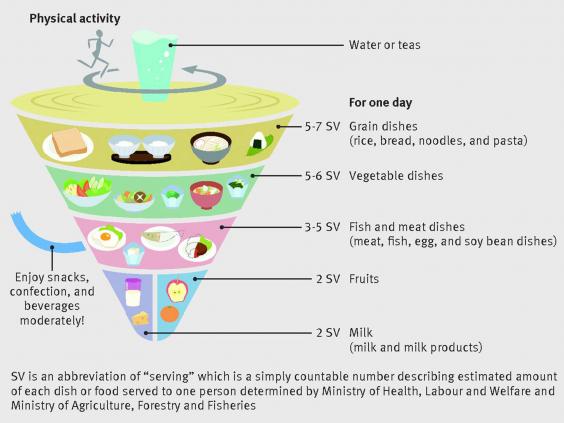Japan's high life expectancy linked to diet, study finds
The study assessed the diets of tens of thousands of men and women

The high life expectancy enjoyed in Japan is largely down to the nation's healthy diet, according to a new study.
The population of the island nation, which has one of the lowest mortality rates in the world, eat diets high in certain carbohydrates, vegetables, fruits as well as fish and meat. Such foods make for a diet low in saturated fats, processed foods and high in carbohydrates gained from both rice and vegetables.

The Japanese government's official advice on food (BMJ)
The Japanese government outlined a recommended food guide for the nation in 2005. Around a decade later, researchers at the National Centre for Global Health and Medicine in Tokyo investigated how following the food guide affected the country’s mortality rate.
READhe t
Such participants were less likely to have cerebrovascular vascular disease: a term used to describe conditions caused by problem with blood supply to the brain.
Food trends in 2016
The study concluded: “Our findings suggest that balanced consumption of energy, grains, vegetables, fruits, meat, fish, eggs, soy products, dairy products, confectionaries, and alcoholic beverages can contribute to longevity by decreasing the risk of death, predominantly from cardiovascular disease, in the Japanese population.”
James DiNicolantonio, a cardiovascular research scientist at St. Luke’s Mid America Heart Institute who was not involved in the study, told the Huffington Post: “We can learn a lot about how to be healthy from the Japanese, and it really comes down to ‘eat real food’ and ‘exercise.”
He added that the combination high quality foods low in saturated fats was particularly important.

No comments:
Post a Comment